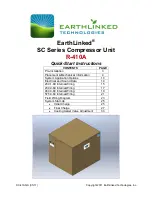
Instruction Manual
Junior II
8
the critically stressed areas of the vessels are examined by
means of suitable testing methods, in order to ensure the
operating safety.
After having reached the total permissible number of
load cycles, the vessel must be exchanged and scrapped.
Record the number of load cycles in writing if you do not
have an automatic cycle-counter.
We recommend that aluminium vessels should be
exchanged after 15 years at the latest.
Please pay attention to and follow these measures, for
your own safety and that of you employees and cus
tomers!
In order not to unnecessarily load the pressure vessels
additionally, the non-return valves, that are meant to
avoid a drop in pressure, and also the pressure maintain
ing valves, which should reduce big pressure fluctuations
as well, should be checked regularly for internal and ex
ternal tightness and functionality.
•
Check the pressure vessels regularly on the inside and out
side for damage from corrosion.
•
Be particularly careful with second-hand pressure vessels,
when their previous operating mode is not specifically
clarified.
2.4.
SAFETY REGULATIONS (EC; partly Germany,
only)
A compressor is identified by German law as being a filling
system if pressure cylinders are filled by the system, especially
when these cylinders are made available for third parties. The
start-up and operation of compressor systems for use as fill
ing stations is governed by the following regulations:
Pressure vessel directive (Directive 97/23/EC) of
29.05.1997
Operating safety regulations (BetrSichV) of 27.09.2002
Machine safety law (GSG) of 11.05.2001
14th regulation to machine safety law (14. GSGV - pres
sure vessel regulation) of 03.10.2002
Technical regulations for pressure gases (TRG 400, 401,
402, 730).
If a high pressure compressor is used for filling pressure
vessels or for the supply of pneumatic systems, the following
regulations apply:
Accident Prevention Regulations (UVV):
BGV A1 of 01. January 2004
Copies of the above regulations are available through the
usual outlets, e.g. in Germany from:
Carl Heymanns Verlag
Luxemburger Str. 449
50939 Köln
Beuth-Vertrieb GmbH
Burggrafenstr. 4 - 7
10787 Berlin
The manufacturer has complied with all applicable regula
tions and the unit is prepared accordingly. If desired, we offer
at our Munich site a partial acceptance test according to §
14 BetrSichV. Please contact our Technical Service Depart
ment with regard to this. They can also supply our leaflet
“IMPORTANT NOTES FOR CERTIFICATION”
.
According to the operation safety regulations (BetrSichV), all
compressor units which will be used as filling stations must
undergo an acceptance test by a professional at their loca
tion before bringing them into service. If pressure vessels
(bottles) are to be filled by the compressor for a third party
then the appropriate permission must be obtained from the
responsible authority before the acceptance test. As a rule,
this is the factory inspectorate. The procedure for obtaining
permission is according to TRG 730, guidelines for permission
to set up and operate filling stations. The test certificates and
documents delivered with the compressor are important and
may be requested during the procedure for obtaining per
mission. In addition, the documents belonging to the unit are
important for recurrent inspections and should therefore be
carefully kept.
Inspections in accordance with the regulations for preven
tion of accidents will be carried out by the manufacturer or
by a specialist.
No guarantees whatsoever are valid for damage caused or
favoured by the non-consideration of these directions for
use.
We strongly emphasize these regulations.
Summary of Contents for Junior II-B-F01
Page 1: ......
Page 2: ......
Page 6: ...Instruction Manual Junior II iv NOTES Model Serial No Date of purchase Dealer address phone no...
Page 41: ...Instruction Manual Junior II 35 8 ANNEX Schematic diagram Lubricating oil list Parts list...
Page 42: ...Instruction Manual Junior II 36...















































